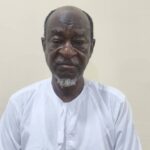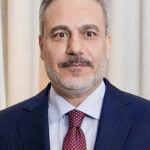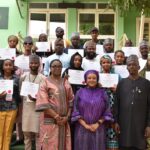By Zubairu Idris, News Agency of Nigeria (NAN)
Available statistics from the UNICEF shows that Nigeria accounts for over two million un-immunised children, including zero dose children globally.
According to health experts, zero dose children are children that lack access to or were never reached by routine immunisation service providers.
The UNICEF Chief of Kano Field Office, Mr Rahama Mohammed-Farah, said recently that there are over 500,000 unimmunised children in Kano, Katsina and Jigawa states, perhaps the worst hit region in the country.
He said this in Kano at the inauguration of a immunisation song entitled: “No More Zero Dose” aimed at motivating parents to give their children and wards more access to immunisation services.
Mohammed-Farah said the song featured some top music stars and UNICEF supporters from Nigeria, Mali, Chad, Cameroon and Guinea, like Cobhams, WAJE, Master Soumy, Sekouba Bambino and Ali Nuhu, among others.
“The #NoMoreZeroDose song sheds the light on the urgent and critical need for increased immunisation coverage in West and Central Africa.
“We, therefore, need to spread the message through this song of the importance of immunisation, and the imperative of getting every child under five fully immunised,” he urged.
According to him, in Katsina State alone, there are 171,491 zero dose children, pointing out that “zero dose children are at risk of vaccine preventable diseases, including polio”.
Experts urge UNICEF to produce the song in the local languages, especially the country’s three major languages namely: Hausa, Igbo and Yoruba, for it to make desired impact.
To change the narrative in Katsina State, the state government in collaboration with development partners such as UNICE continue to evolve strategies to ensure that all eligible children are immunised.
The Katsina State Governor, Dikko Radda recently said that: “vaccination is a fundamental right of every child”.
He said this at the inauguration of healthcare and routine immunisation coordination center, incinerator and distribution of 163 motorcycles to health workers.
Radda said healthy children were the foundation of any prosperous society, adding that it was the duty of his administration to eliminate all barriers to immunisation and other health services.
“With these motorcycles, our health workers will be better equipped to reach remote and un-served areas, ensuring that no child is left behind,” he said.
Mohammed-Farah explained that the UN institution supported Katsina government with the 163 motorcycles as part of the strategies to reach all eligible children across the state.
“They are part of the GAVI-funded Primary Healthcare Memorandum of Understanding (MoU).
“It is a three-year initiative aimed at strengthening Routine Immunisation (RI) and primary healthcare systems to reduce morbidity and mortality, amongst children,” Mohammed-Farah said.
Meanwhile, UNICEF in collaboration with Safe Space Humanitarian Initiative (SASHIN) of Katsina governor’s wife, Hajiya Zulaihat Dikko-Radda, inaugurated another strategy called: “Gender Mainstreaming,” popularly known in local parlance as: “Majalisar Rigakafi”.
Zulaihat said the initiative was aimed at increasing immunisation acceptance by engaging male parents in routine immunisation and other primary healthcare-related issues.
“Over the years, we have made remarkable progress in improving access to healthcare.
“However, some challenges remain low immunisation uptake, misconceptions about the vaccines, and limited access to primary healthcare services.
“It is evident if we are to succeed in overcoming these challenges, we must adopt innovative, community-focused strategies that leverage the collective power of our people,” she said.
She said the new strategy was a platform that empowers both men and women to engage in open informal discussions about immunisation, antenatal care, child nutrition, and other primary healthcare services.
“In many communities, women bear the primary responsibility for health of their families, yet, they face barriers such as lack of support from their male counterparts or cultural norms that limit their decision-making power.
“Another unique feature of this initiative is its reliance on informal settings where people feel comfortable and heard, whether is a conversation under a tree, in market square, or during a family gathering.
“These interactions create opportunities to share accurate health information, dispel myths, and inspire action,” Zulaihat said.
Speaking as a panelist at the event, Takudzuwa Kanyangara, UNICEF Gender Development Manager, said recent Demographic and Health Survey showed good news for Katsina state on immunisation uptake.
“The good news is that, in Katsina State, the rate of immunisation is higher than 45 per cent.
“Gender plays a crucial role in both polio and routine immunisation efforts, as men are often the decision makers in households,” she said.
Still, in a goodwill message, the UNICEF Chief of Kano Field Office, represented by UNICEF Health Specialist, Hajiya Saudat Basheer, believed that engagement of men and fathers would significantly improve the immunisation coverage.
“Our children should not be dying from diseases that are easily preventable with vaccines.
“Fathers and men have come together to help us achieve the goal of zero dose and polio-free Katsina State.
“Our vision is to scale up this initiative so that all men and fathers become committed members, dedicated to making a difference in improving immunisation coverage and supporting global polio eradication,” he said.
The Executive Secretary, Katsina State Primary Healthcare Development Agency (SPHDA), Dr Shamsudeen Yahaya, said the government engaged community health extension workers and midwives to boost healthcare services for women and children under the GAVI initiative.
Yahaya said that 1,260 community health influencers and promoters were trained to providing effective primary healthcare services, including routine immunisation in rural communities.
He further said the government rehabilitated 102 primary healthcare centres to boost healthcare services delivery for children and women, especially in rural areas across the state, among other.
Yahaya, during the distribution of the 163 motorcycles to health workers, identified insecurity as one of the major factors responsible for the law coverage of the immunisation in the communities affected by the menace.
He added that inadequate health workers was also hindering effective primary healthcare services delivery, as the state has only about 1,700 primary healthcare facilities.
“As we know, a lot of health workers are retiring, if we can have automatic replacement policy, it will go a long way to address human resources challenge in future,” he advised.
He also called for upward review of casual workers salary from N10,000 to at least N30,000 per month due to the current economic situation in the country.
The Commissioner for Health, Alhaji Musa Adamu, also said that health is among the priority sectors of the present administration in the state.
According to Adamu, the state government will continue to take measures to boost effective healthcare service delivery.
However, in spite these efforts, the sector encounter some challenges that affect immunisation coverage and effective healthcare service delivery in the state.
Stakeholders should partner to comprehensively address all factors militating against immunistion, child survival and maternal health, says a health expert, Abdulbasir Kabir.
Some of the factors, he said, are misconceptions, poverty, and lack of commitment from the health workers.
On his part, Malam Abdulkadir Waisu, a gender advocate, said sometimes, parents deny their children and wards access to immunisation if they reacted to the previous one they took.
Whatever the challenges maybe experts urge governments and their development partners to intensify immunisation campaign through religious leaders and traditional rulers.
They say doing so would increase immunisation coverage and make children healthier with other multipliers implications for their future. (NANFeatures)
**If used please credit the writer and News Agency of Nigeria.












